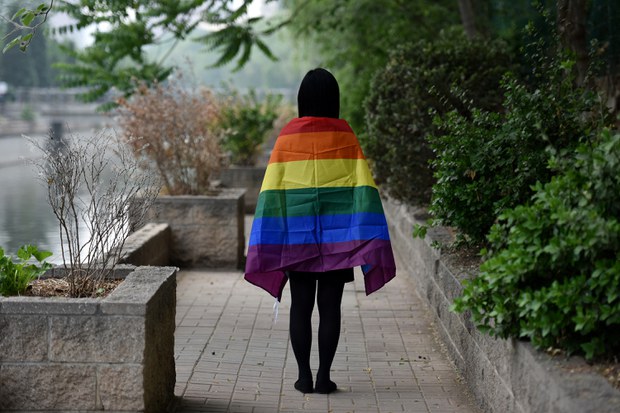Chinese censors shut down key LGBTQ+ social media accounts
Share

A gay student poses with a rainbow flag in Beijing, May 10, 2019. “There must have been orders from higher up banning lesbians, gays and transgender folk,” said a Shanghai-based lesbian who declined to give her name for fear of reprisals. “It’s about awareness of one’s own gender, and what gender you think you are.”
Chinese government censors have shut down key LGBTQ+ social media accounts in a further crackdown on sexual minorities.
Public accounts for the Beijing Lala Salon, Wandouhuang, Transtory, Outstanding Partners, Ace and the Flying Cat Brotherhood were shuttered on the eve of Chinese Valentine’s Day on Aug. 22, veteran activist Li Tingting said.
“Such accounts have been targeted once before two or three years ago,” said Li, who is better known in feminist circles as Li Maizi. “The government departments in charge of internet management have always targeted accounts linked to sexual minorities, which aren’t encouraged by the Chinese government.”
She said not all of the accounts were linked to LGBTQ+ groups – some were more broadly feminist.
The move comes after Chinese officials removed an LGBTQ+ anthem titled “Rainbow” by Taiwanese pop star A-Mei from her setlist from a concert earlier this month in Beijing, while security guards forced fans turning up for the gig to remove clothing and other paraphernalia bearing the rainbow symbol before going in, according to media reports.
Sherry Zhang, who goes by the stage name A-Mei, wrote the song for all of her lesbian, gay, bisexual, transexual and questioning friends, and it is frequently heard at Pride events in Taiwan. Her fans among the LGBTQ+ community often turn up and wave rainbow flags or wear rainbow clothing in a show of solidarity, confident that the song will make an appearance.
Li, who was among five Chinese feminists detained ahead of International Women’s Day in 2016 for planning a campaign against sexual harassment on public transport, added: “The accounts targeted included the Beijing queer women’s center Lala Salon, Wandouhuang, which is a feminist platform.”
Advocacy and Promotion
She said the Flying Cat Brotherhood was a gay men’s group, while censors had also targeted the transgender account Transtory and Ace, a group representing asexuals.
The Wandouhuang artists’ group was set up by Toni, Mengxia and Xiao Lufei, who all graduated from the Maryland Institute of Art in 2019, according to a bio that was still visible online on Wednesday.
Beijing Lala Salon was set up in November 2004 as a non-government organization offering social activities for lesbians, to advocate for LGBTQ+ rights and to promote lesbian culture.
Its account on the social media platform Weibo was still visible on Thursday, but displayed no content.
They had offered literary and social events, film and television screenings, forums, lectures and a drama group.
Li said she once volunteered for the group as a project manager around 10 years ago.
“I felt as if [the authorities] are ticking these tasks off a list,” she said.
‘Orders from higher up’
A Shanghai-based lesbian who declined to give her name for fear of reprisals said she had been a member of Transtory and Ace.
“There must have been orders from higher up banning lesbians, gays and transgender folk,” she said. “It’s about awareness of one’s own gender, and what gender you think you are.”
LGBTQ+ and health rights activist Lu Jun, who now lives in New York, said that was likely.
“It may seem that it’s Tencent shutting down these WeChat accounts, why would they do that?” Lu said. “It must be that the authorities issued an administrative order, which means that Tencent would break the law if it didn’t block these accounts.”
“This is the will of the authorities.”
He said the move is a violation of the right to free speech, but also of LGBTQ+ rights.
In April, two LGBTQ+ students from Beijing’s Tsinghua University lodged an administrative lawsuit against China’s Ministry of Education after being harassed and threatened by the authorities for leaving rainbow flags out for people to take in a campus supermarket.
While homosexuality was decriminalized in China in 1997, and removed from official psychiatric diagnostic manuals in 2001, ruling Chinese Communist Party leader Xi Jinping has ushered in a far more conservative attitude to sexuality than his predecessors.
Activists have said the crackdown stems in part from the government’s fear of civil organizations as a threat to party rule.
Translated by Luisetta Mudie. Edited by Malcolm Foster.







